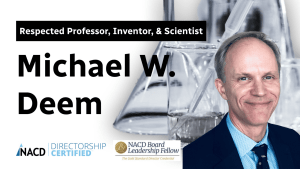
Michael Deem
Michael W. Deem | What Are the 4 Branchings of Life Science?
What are the four branches of life science? These branches study the origin and growth of life on earth. They also learn how living organisms interact with each other and the environment. Other components include embryology and genetics, which study the inheritance of characters and heredity (the transmission of traits from parents to offspring). A fourth branch, eugenics, deals with race and ethnicity factors. These fields of life science lead to several careers. Life sciences form the scientific basis for many of the breakthroughs that have led to improvements in our lives.
Cell Biology
The study of cells and their function is an integral part of biology. Cells are the basic units of all life and studying them allows scientists to learn about the various aspects of larger organisms. Biologists study the machinery inside cells and how they communicate with each other. They can also check the composition of cells and their interactions with larger organisms. Cell biology has many subtopics, including metabolism, cell communication, the cell cycle, and cytochemistry.
When studying the biology of cells, scientists use many different tools and techniques to study the human body. They use imaging techniques to analyze the various organelles and track cells as they divide and grow. They also use genetic and biochemical tests to study organisms’ responses to toxins and environmental stressors. Researchers also use biochemical techniques to label specific proteins with fluorescent tags. The data obtained from these tests is integrated using sophisticated computational tools.

Michael Deem
Physiology
Physiologists study the physiological processes of human and animal bodies. For example, some physiologists study the behavior of single proteins, while others explore the interactions of cells in tissues and organs. Finally, some physiologists study the integration of multiple systems, including the nervous and endocrine systems. Physiologists’ work lays the groundwork for several branches of biology and the clinical sciences. They also play important advisory roles in many fields.
The study of physiology can be applied to all forms of living systems. Physiologists study the functioning of human body parts, from the nasopharynx to the trachea. Research on biologists the behavior and function of different body systems and the effects of various conditions on them. Physiologists study human, animal, and plant roles and responses to challenging situations. There are also several sub-branches of physiology, including cell and membrane physiology.
Entomology
Entomology is a branch of science focusing on insects, spiders, and other creepy crawly creatures. The unit has roots as far back as 400 million years and is often considered a subset of zoology. Although primarily focused on insects, entomology also includes studying other arthropod groups, such as arachnids and crustaceans. Entomology is also used to understand and evaluate environmental quality and biodiversity.
Entomologists can teach at academic institutions, nonprofit organizations, and private businesses. One of the most common roles of entomologists is in the Cooperative Extension Service (CES), which provides information to the public regarding pest control. For example, a survey entomologist reviews important crops to identify insect outbreaks and alerts farmers before they become a significant problem. Entomologists also help control pests that can damage crops and ecosystems.

Michael Deem
Zoology
Zoology is one of the branches of life science that studies animals. It includes the study of living and extinct animals and the behavior of all of them. The branch of science often involves working with geologists, anthropologists, and archaeologists, among other fields. Among the different components of the subject, zoology covers animal behavior and genetics, as well as the origins and evolution of life.
In the sixteenth century, scientific zoology advanced, becoming a separate branch of study from medical studies. As a result, universities became the natural home for this active pursuit of knowledge. This spawned the study of the human body and the evolution of species. As a result, zoology is one of life science’s four branches and is the fourth most popular.
Michael Deem has received a number of awards over the years, including NSF Postdoctoral Fellowship in Chemistry (1995-1996); Assistant and tenured Associate Professor, UCLA (1996-2002); NSF CAREER Award (1997-2001); Northrop Grumman Outstanding Junior Faculty Research Award (1997); Visiting Professor, University of Amsterdam (1999); A Top 100 Young Innovator, MIT’s Technology Review (November 1999) (Profile and Original Profile); Alfred P. Sloan Research Fellow (2000); Camille Dreyfus Teacher-Scholar Award (2002); John W. Cox Professor, Rice University (2002-2020); Allan P. Colburn Award (2004); Editorial Board Member, Protein Engineering, Design and Selection (2005-present); Fellow, American Institute for Medical and Biological Engineering (2005); Member, Board of Directors, Biomedical Engineering Society (2005-2008); Fellow, American Physical Society (2006); Member, Rice University Faculty Senate (2006-2009); Vaughan Lectureship, California Institute of Technology (2007); Member, Nominating Committee, Division of Biological Physics, American Physical Society (2007); Member, Board of Governors, Institute for Complex Adaptive Matter (2007-present); Fellow, Biomedical Engineering Society (2009); BMES Representative on the FASEB Publications & Communications Committee (2009-2012); Professional Progress Award (2010) (Profile); Fellow, American Association for the Advancement of Science (2010); External Scientific Advisor, Princeton Physical Sciences-Oncology Center (2010-present); Associate Editor, Physical Biology (2011-2018); Edith and Peter O’Donnell Award, The Academy of Medicine, Engineering & Science of Texas (2012); Founding Director, Systems, Synthetic, and Physical Biology (2012-2014, raised $0.5M seed funding); Phi Beta Kappa Visiting Scholar (2012-2013); Chair, Department of Bioengineering (2014-2017, raised $12M in external startup funding for new faculty); Editorial Advisory Board, Bioengineering and Translational Medicine, (2016-2019); Donald W. Breck Award for zeolite science (2019); and NACD Board Leadership Fellow and Directorship Certification (2020). His name has been synonymous with innovation and thought-provoking research for three decades. He enjoys mentorship, vaccine design, and helping others invent the future.

Michael Deem
Useful Links
Michael W. Deem Research
Michael W. Deem Research Bio
Michael W. Deem
Michael Deem
Certus LLC
Dr. Michael Deem
Dr. Michael W. Deem
Michael W. Deem Crunchbase
Michael W. Deem google scholar
Michael W. Deem Academic Tree
Michael W. Deem Research Gate
Michael W. Deem ORCID
Michael W. Deem Web of Science
Michael W. Deem Frontiers Bio
Michael W. Deem Scopus
Michael W. Deem DBLP
Michael Deem Gravatar
Michael Deem About me
Michael W. Deem WordPress
Michael W. Deem Tumblr
Michael W. Deem Instapaper
Michael W. Deem FYI.TO
Michael W. Deem JimDoSite
Michael W. Deem Jigsy
Michael W. Deem Blog
Michael W. Deem Blog II
Social
Michael W. Deem LinkedIn
Michael W. Deem Wikipedia
Michael W. Deem Twitter
Michael W. Deem YouTube
Michael W. Deem YouTube II
Michael W. Deem YouTube III
